S u m m a r y
|
| Catalogue
Number: |
AMD 48-618 - Abe's
Superstars |
| Scale: |
1/48 |
| Contents and Media: |
Waterslide decals - Decal
sheet plus instructions and notes |
| Price: |
MSRP USD$10
available from Aeromaster's website |
| Review Type: |
FirstLook |
| Advantages: |
Perfect register; thin;
minimal carrier film; comprehensive stencil data; good
instructions and background; accurate; first-time depiction in
decal form for the new markings. |
| Disadvantages: |
|
| Recommendation: |
Recommended |
Reviewed
by Rodger Kelly

Aeromaster Decals' 1/48 scale Abe's Superstars will be available
online from Squadron.com
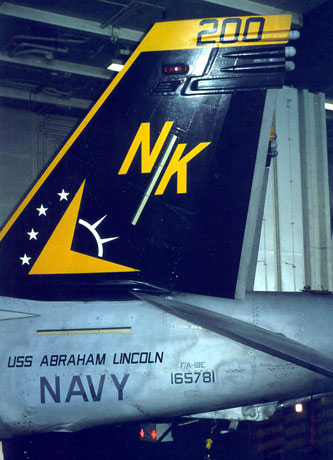 Aeromaster
48-618 provides markings for two aircraft from CVW-14 that were aboard
the USS Abraham Lincoln in December 2002. Aeromaster
48-618 provides markings for two aircraft from CVW-14 that were aboard
the USS Abraham Lincoln in December 2002.
First aircraft is Bureau
number 165781, a brand new F/A-18E belonging to VFA-115 “Eagles”.
The aircraft carries full colour CAG markings and features the
old-style black vertical stabilizers.
The aircraft is painted in the
standard F/A-18 Tactical Paint Scheme (TPS) of FS 36320 dark ghost
grey over FS 36375 light ghost grey with the radome being tan with a
bare metal tip.
The markings consist of:
-
Black 200 modex
“shadowed” in yellow for the nose and the tops of the wing flaps,
with a further black pair for the fin caps of the vertical
stabilizers. There is also a further set of nose and wing flap
modex. This time they are separate black numerals with separate
yellow “shadowing”. I guess that these were provided in case the
one-piece ones were out of register – not that they are on my
sample. Further, smaller black “00”s for the nose undercarriage
doors are also provided.
-
VFA-115 tiles for
the spine. Again, “shadowed” in yellow with a further set supplied
as two-part decals in case of any register problems.
-
VFA-115’squadron
insignia and yellow stylized CVW-14 NK airwing identifiers for the
vertical stabilizers. You will have to paint the fin caps and
leading edge of the vertical stabilizers yellow as well as painting
the vertical stabilizers black yourself.
-
USS Abraham Lincoln,
NAVY titles and Bureau number for the rear fuselage.
-
Nose art consisting
of a NYFD badge for both sides of the fuselage.
-
“In memory of”
script for the nose of the port-side fuselage.
-
CAG and DCAG
(Captain Scott “NOTSO” Swift – ya gotta love that!) names for either
side of the fuselage beneath the windscreen.
-
Plane Captain of The
Year name for the nose undercarriage door.
-
A pair of VFA-115
zaps in grey for the centre-line tank.
-
Stencil data is
minimal but includes a complete set of lo-viz national insignia,
intake warnings, ejection seat triangles and a wing-walk for the top
of the port-side chine.
The other aircraft is Bureau
number 164600, an F-14D “belonging to” the CO of VF-31 “Tomcatters”
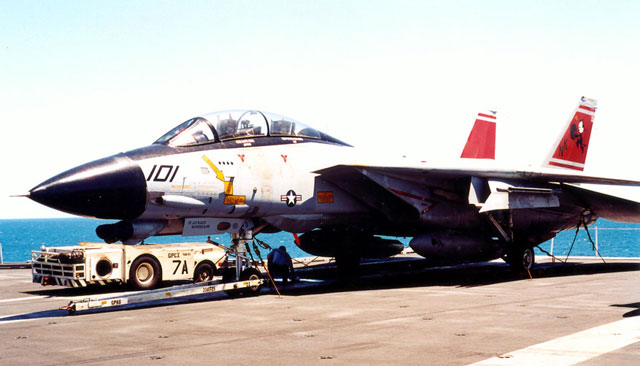
The aircraft is finished in
the standard TPS worn by F-14s consisting of Dark Ghost Grey FS 36320
upper surfaces, Light Ghost Grey FS 36375 lower surfaces. VF-31 have
added a black nose, canopy frame and fuselage spine.
The aircraft is marked in a
scheme reminiscent of the markings that VF-31 painted their Tomcats in
when they first transitioned into them from the F-4 Tomcat.
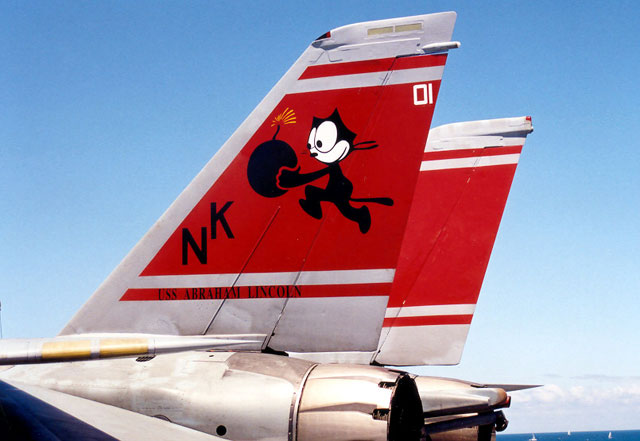
The markings consist of:
-
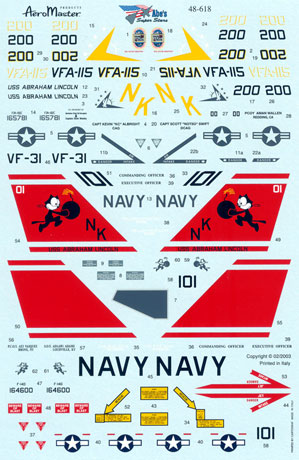 Red
stripes on the inner and outer surfaces of the vertical
stabilizers. The outer sides feature the squadron insignia of Felix
the cat with a bomb, black NK airwing identifiers, and USS Abraham
Lincoln titles. Red
stripes on the inner and outer surfaces of the vertical
stabilizers. The outer sides feature the squadron insignia of Felix
the cat with a bomb, black NK airwing identifiers, and USS Abraham
Lincoln titles.
-
Black VF-31 titles
for the fuselage strake – you will have to paint the strakes red
yourself.
-
Black NAVY titles
and Bureau number for the rear fuselage
-
Black 101 modex for
the nose and tops of the wing flaps with small white 01s for the
vertical stabilizers.
-
Smaller “Felix” zaps
in grey for the TARPS pod and intake mounted drop tanks.
-
Pilot’s and RIOs
names in white for the canopy rails and Plane Captain’s names in
black for the nose gear doors.
-
A set of full colour
national insignia. The insignia is in two parts and you have to
apply the red “bars” on top of the blue and white stars and bars –
again, a register thing.
-
Stencil data is
quite comprehensive and is in the old style of black lettering on a
yellow background for the rescue information and white lettering on
a red background for warning data.
The placement guide is a
full-colour two-sided affair that shows left-hand side profiles of
each aircraft as well as a top and bottom view of a Hornet and an
F-14. The placement guide also provides a list of references that
were consulted in producing the decals as a painting guide.
Interestingly, it calls VFA-115 the “Arabs” a name that it shed
a long time ago in favour of “Eagles”. Suggested kits are the
Hasegawa F-14D and the Italeri F/A-18E.
The decals have been
printed in Italy by Cartograf. The colours appear to be correct and
the yellow of VFA-115s squadron markings seems to be very dense no
doubt to combat the bleed through problem when it is applied over the
black of the vertical stabilizer.
The decal sheet and placement
guide come packed in a clear plastic zip-loc bag.
A nice sheet from Aeromaster
and to my knowledge, it is the first time that the new VFA-115 F/A-18E
CAG markings have been seen in decal form.
Recommended!
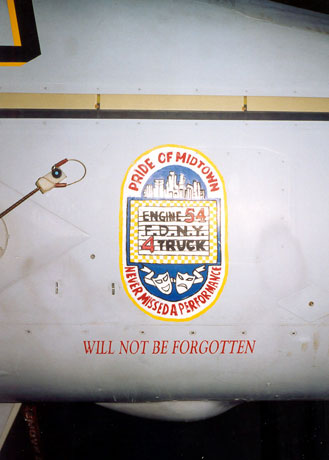 The
USS Abraham Lincoln is a regular visitor to Perth. I was fortunate
enough to have been able to photograph both aircraft featured on this
sheet and I have included a couple of photos with this review. The
USS Abraham Lincoln is a regular visitor to Perth. I was fortunate
enough to have been able to photograph both aircraft featured on this
sheet and I have included a couple of photos with this review.
The VF-31 photos were taken in January 2001 whilst the VFA-115 ones
were taken in December of 2002. Unfortunately, the VFA-115 aircraft
was stuck below in a corner of the hangar bay so photography was
difficult and I had to be satisfied with a couple of close-up shots. |
Home | What's
New | Features
| Gallery |
Reviews | Reference
| Forum
| Search